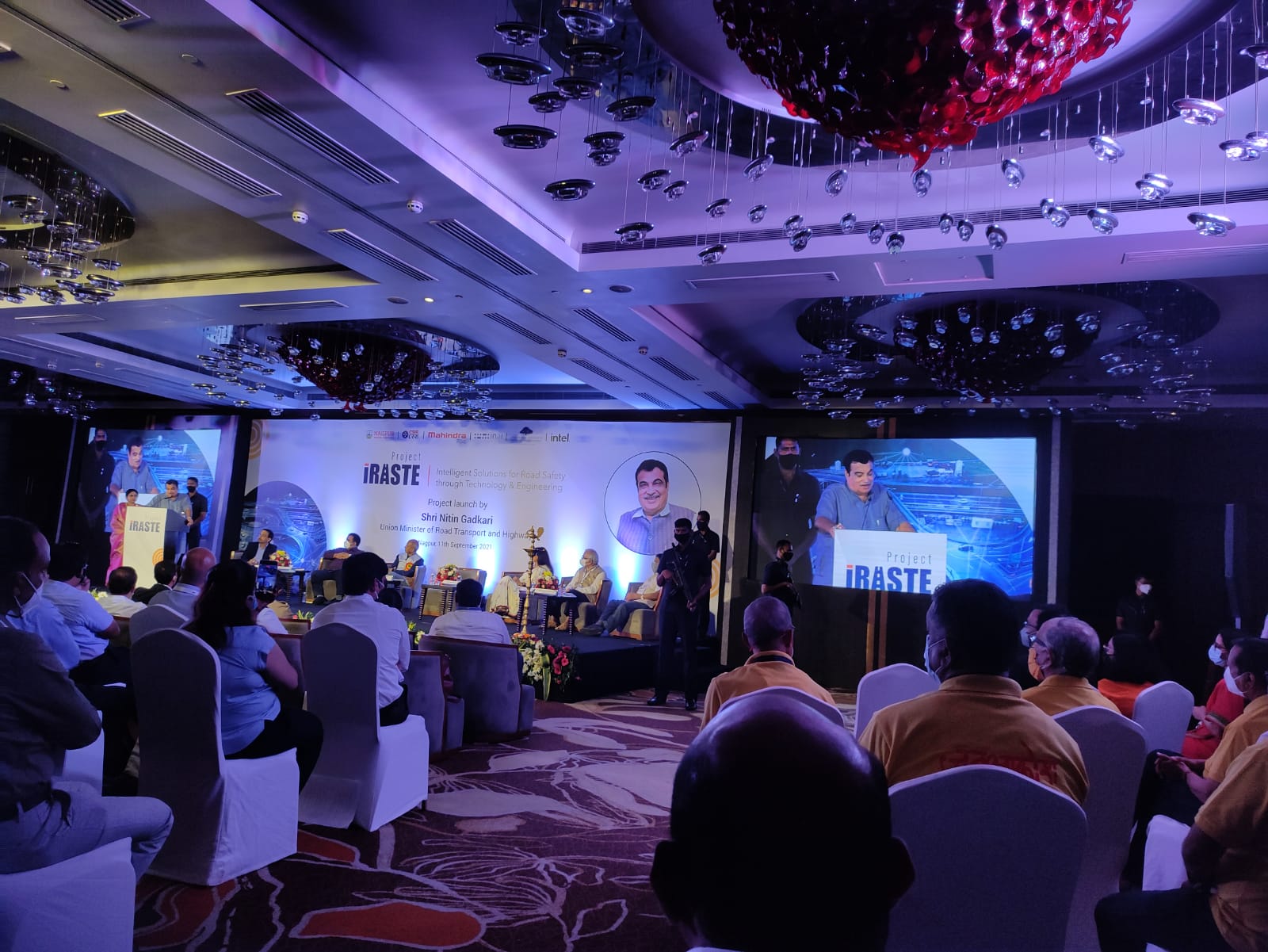Shri Nitin Gadkari, Minister For Road Transport & Highways of India launches AI-powered Projects iRASTE for road safety in Nagpur.
Collaborative developed by Intel India, INAI, IIIT-Hyderabad, CSIR-CRRI, Mahindra & Mahindra, and Nagpur Municipal Corporation.
In a unique collaborative initiative between the government, industry, and academia towards advancing road safety, Intel, INAI, IIIT-Hyderabad, CSIR-CRRI Central Road Research Institute), Mahindra Mahindra, and NMC (Nagpur Municipal Corporation) today launched Project iRASTE (intelligent Solutions for Road Safety through Technology and Engineering) in Nagpur. Today, Shri Nitin Gadkari, Hon’ble Minister for Road Transport Industries, inaugurated the project in the presence of Shri Vikas Mahatme, Rajya Sabha MP, Shri Radhakrishnan B, NMC Commissioner, and the project consortium members.
- Leveraging the power of Artificial Intelligence, Project iRASTE (intelligent Solutions for Road Safety through Technology and Engineering) aims to achieve up to 50% decline in road accidents in Nagpur city and create a blueprint for India towards Vision Zero.
- Through an innovative and holistic road safety framework, it focuses on three crucial areas – vehicle safety, mobility analysis, and road infrastructure safety.
Nivruti Rai, Country Head, Intel India, and Vice President, Intel Foundry Services said, “Technologies such as Artificial Intelligence will play o transformational role in enabling smarter and safer vehicles, roads, and drivers. Intel is committed to enabling road safety and reducing fatalities in India through the use of technology solutions. am excited to launch Project iRA5TE, a unique collaborative initiative that brings together critical players to drive road safety in Nagpur and develop o blueprint for country-wide adoption towards Vision Zero.

Redefining road safety with an innovative and holistic framework, Project iRASTE focuses on the three key aspects of vehicle safety, mobility analysis, and road infrastructure safety. It aims to re-imagine road safety with the predictive power of Al. Advanced Driving Assistance Systems (ADAS) will offer an economical way to enhance the safety of fleets and road users. ADAS alerts. alongside driver assessments and training can notably improve driver performance. Mobility analysis will continuously monitor dynamic risks of the entire road network to define grey and black spots – areas that are high risk or accident-prone. Preventive maintenance of such stretches will avert black spots before they claim lives.
About the project, Dr. Shekhor C. Monde, DG, CSIR said, “This is o wonderful example of multi-institutional collaboration between different partners from academics, industry, and government with complementary skills to address the problems faced by society on o daily basis. I am glad to note that CSIR-Central Road Research Institute (CRRI) a pioneer in introducing the road safety audit programs on national and state highways and having completed the road safety audit of almost 9000 km will be providing necessary technical guidance in this project. They will help in identifying the occident-prone locations and also evaluate the driver’s behavior before and after the installation of CAS (Collision Avoidance System) in their vehicles. This project being in Nagpur will certainly be a milestone In tackling the issue of road safety in India through the intervention of advanced technologies and con be emulated in different cities as well.”
Under this project, Nagpur Municipal Corporation’s fleet of vehicles will be equipped with (CAS) collision avoidance technology, that can reduce accidents and near misses by up to 60%. Sensors in these technologies will also help map the dynamic risk of the entire road network (grey spot map) for the first time. Road maintenance agencies can use such information to prevent accident-prone zones (black spots) before they claim lives. Project iRASTE will conduct detailed studies to recommend engineering fixes for existing black spots and implement an Ai-powered system for continuous monitoring of road infrastructure quality.
Prof P J Narayanan, Director, IIITH said, “Academic institutions have enormous knowledge and expertise that can and must be used to improve the condition of society. mT H.vderabod has been focussing on Applied Research that does precisely that. Through AI, we want to transform academic expertise into population-scale impact. Roads and vehicles are the lifeline of the country but are also fraught with danger to drivers and pedestrians. We Look forward to playin9 o role in reducing accidents significantly through the iRASTE project in the coming years.”
Project iRASTE uniquely leverages the expertise and capabilities of each of the partners. Intel India brings onboard systems based on ADAS technology. CSIR-CRRI brings domain expertise in road engineering and IIIT-Hyderabad is undertaking Al-based research to address population-scale road safety through the INAI center for applied Al research (https://inai iiit.ac.in/). Mahindra & Mahindra with their vast experience of driving major road initiatives will conduct road safety public awareness programs and driver training in Nagpur.
About iNAl
INAI is an initiative to apply Al to population-scale problems in the Indian context, combining research and translation, with a focus on healthcare and smart mobility domains. This collaborative effort, championed by intel and catalyzed by the Government of Telangana, is anchored at IIIT- Hyderabad. INAI leverages the broader computing strengths and expertise in Al at IIIT-H, the technology leadership and architecture strength of intel, and the framework and activities of GitHub- Data. AI-Powered Projects “iRASTE” for Road Safety in Nagpur.
About IIIT-Hyderabad
The international institute of Information Technology, Hyderabad (IIIT-H) is an autonomous research university founded in 1998 that focuses on the core areas of information technology, such as Computer Science, Electronics, and Communications, and their applications in other domains through inter-disciplinary research that has a greater social impact. Some of its research domains include Visual Information Technologies, Human Language Technologies, Data Engineering, VLSI and Embedded Systems, Computer Architecture, Wireless Communications, Algorithms and Information Security, Robotics, Building Science, Cognitive Science, Earthquake Engineering, Computational Natural Sciences and Bioinformatics, Education Technologies, Power Systems, IT in Agriculture and e-Governance. AI-Powered Projects “iRASTE” for Road Safety in Nagpur.



